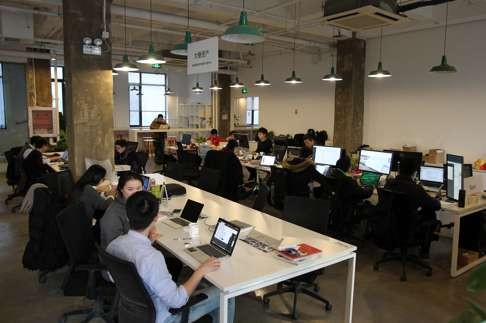
WeWork to set up co-working spaces in Shanghai, Hong Kong to tap growing start-up communities
New York-based WeWork, backed by China’s Legend Holdings, poised to expand to other Chinese cities over next 12 months
New York-based co-working space provider WeWork, in which Lenovo Group parent Legend Holdings is a major investor, is poised to expand in Hong Kong, Shanghai and other Chinese cities this year to tap their growing start-up communities.
WeWork will expand into Shanghai this June and Hong Kong during the second half of this year, said a company spokesperson. It will open in other Chinese cities over the next 12 months.
“We see great opportunities in China with its active capital investment market and the government’s push of entrepreneurship,” said Fred Lu, general manager for mainland China.
The booming start-up scene gives us a lot of opportunities but our business is not tied to it
WeWork rents offices from landlords and renovates them into hip co-working spaces and common working areas that promote social interaction. It then leases the resulting smaller offices to start-ups, freelancers or any companies that are looking for flexible working space.
The new WeWork space in Shanghai will occupy two floors of a six-storey building run by property developer Shanghai DOBE Cultural & Creative Industry Development. Each floor spans 1,600 sq m.
DOBE said the remaining floors will be leased to other multinationals . The building is located in Jingan district, one of the most expensive commercial areas in the city.
Earlier this month, Legend Holdings and its Hony Capital fund led a US$430 million investment into WeWork, pushing the company’s valuation to US$16 billion, higher than technology giants such as music streaming service Spotify and leading drone maker DJI from Shenzhen.
WeWork is likely to face strong competition from local players. China’s Ministry of Science and Technology gave 135 companies the status of “national technology incubator” last year. It added 362 more to the list this year.

Some of these local incubators were recently valued at billions of yuan and are on an expansion spree to multiple cities in the country. URwork, an incubator in Beijing, received more than 200 million yuan (US$30.73 million) in a round of funding last week, raising its valuation to 4 billion yuan.
Another Beijing-based incubator, Kr Space, reached a 1-billion-yuan valuation benchmark last January. It has expanded to seven more cities in China and will increase that to eleven by the end of this month.
These Chinese companies not only provide office space but also services such as mentorship and introductions to investors.
WeWork does not incubate start-ups. It differentiates itself by serving a wider range of customers from freelancers to employees from large corporations, according to Lu.
“The booming start-up scene gives us a lot of opportunities but our business is not tied to it,” he said.

